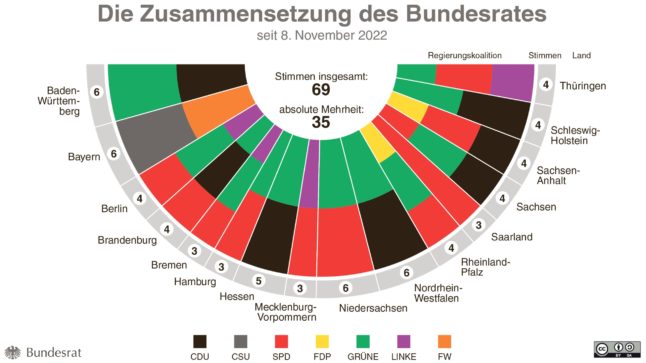INTERVIEW: Germany on track to pass dual citizenship despite opposition

In an exclusive interview with The Local, Hakan Demir, a German MP working on the coalition’s citizenship reform law — says he expects the law to pass in the first half of 2023 — despite fierce criticism recently from opposition conservatives.
For internationals in Germany anxiously waiting for Germany to liberalise its citizenship laws, excitement changed to nervous trepidation in early December. After The Local first reported in October that the so-called traffic light government would both allow dual citizenship and shorten the time someone needed to be resident in Germany to apply for citizenship – readers took to social media to voice their elation and relief.
But just over a month later, the government’s plans provoked strong reactions in some newspaper editorials and among conservative Christian Democrats (CDU).
“The coalition’s plans for dual nationality are false, dangerous and they have to be stopped,” CDU member of parliament, Stefan Heck told the Bundestag.
READ ALSO:
- ‘Dangerous and wrong’: Why German MPs are clashing over citizenship plans
- Why are Germany’s planned citizenship reforms coming under fire?
At the same time, Free Democrat (FDP) General Secretary Bijan Djir-Sarai – whose party is part of the government coalition – said “now is not the time to simplify citizenship law,” since there was “no progress” in combatting illegal immigration. That fuelled fears among internationals that the FDP would pull its support.
Others worried the CDU would block dual citizenship in Germany’s upper chamber – the Bundesrat – just as it did to a dual citizenship proposal in 1999.
But Hakan Demir – the Social Democrat (SPD) parliamentary rapporteur for the new law - told The Local that neither scenario is likely.
READ ALSO: EXPLAINED: Could Germany’s conservatives block dual citizenship?
During an interview for The Local’s Germany in Focus podcast, Demir reaffirmed the coalition’s commitment to the new law.
Coalition remains united on dual citizenship
“For the FDP, as far as I know, their problem was mainly the timing,” Demir told The Local, saying the coalition will now first pass two laws on residence and work rights for migrants and refugees in Germany. Once those are through, the coalition will then pass the citizenship reform law. “Now, there’s no problem with the timing,” says Demir.
Demir says the result might be that citizenship reform passes before the end of June 2023, rather than the end of March as might have originally been expected. He anticipates Chancellor Olaf Scholz’s Cabinet will say yes to the law in either January or February before sending it to the Bundestag, where three MPs – one from each government party – will be responsible for getting it through the Bundestag and its Interior Committee. Those are Demir for the SPD, Filiz Polat for the Greens, and Stephan Thomae for the FDP. All three have previously spoken to The Local in favour of dual citizenship and the new law.
“We have a really good connection with each other,” Demir says of the three rapporteurs. “We’re all very committed to this law and to passing it next year.”

The Greens' Filiz Polat and FDP's Stephan Thomae, also serve as parliamentary rapporteurs on the traffic light coalition's citizenship reform bill. Photos: Inga Haar
Conservatives don’t have the votes to block citizenship reform
As with all German laws, citizenship reform will have to clear Germany’s upper chamber, the Bundesrat – which represents Germany’s federal states - after passing the Bundestag. In 1999, the CDU used its majority there to block a dual citizenship proposal – even though the proposal had a Bundestag majority.
But Demir says it’s a different situation this time.
READ ALSO: HISTORY: What’s behind the push to reform dual citizenship laws in Germany?
“The conservative CDU and CSU have had a problem with a law like this for more than 30 years. We were having the same discussions at the end of the 1990s and their positions haven’t changed,” says Demir.
But, although they’re part of many state-level coalition governments, which send delegates to the Bundesrat - Demir says Germany’s conservatives simply aren’t as strong in Germany’s upper chamber as they were in 1999.
The CDU and CSU currently have less than 20 votes in the Bundesrat, but can still sometimes block certain legislation due to the complex way the Bundesrat votes. In late November, it did just that on citizen’s allowance, or Bürgergeld, by forcing abstentions on the state governments they were a part of. That prevented Bürgergeld from getting the 35 explicit ‘yes’ votes it needed to pass the Bundesrat.

The current party composition of Germany's upper legislative chamber, the Bundesrat, which represents state governments. A citizenship reform bill must pass both the Bundestag and Bundesrat, which doesn't vote on party lines. But a Bundesrat veto will be hard to achieve. Image: Bundesrat
But while it may be enough to block some legislation, Demir says that’s not enough to veto a new citizenship law.
Why is that? That's because Bundesrat voting rules change depending on whether the law it's voting on is mainly a federal responsibility - as citizenship is - or whether the law would involve sharing responsibility with federal states - as Bürgergeld did.
If the law concerns a federal responsibility, the Bundesrat cannot vote it down through abstentions, as in the case of Bürgergeld. Vetoing citizenship reform would need 35 explicit 'no' votes.
“That doesn’t mean the Bundesrat has nothing to say. But in the Bundesrat, to stop this law, you need 35 votes out of 69,” says Demir. “The other side now needs 35 ‘no’ votes and they simply don’t have those ‘no’ votes. I expect it will pass easily.”
The citizenship reform plans in a nutshell
Under the proposed draft law, dual citizenship will be allowed for non-EU nationals as well as EU ones. German law currently restricts dual citizenship for naturalising non-EU nationals, and for Germans naturalising in a non-EU country, unless granted an exception.
The wait to become German will also be reduced from eight years of residence to five. People who have demonstrated good German language skills – typically by passing a B2 test – can currently cut their wait short to six years. The traffic light government plans to reduce that to three years, but require a higher level of German. Fast track applicants will, under the new plans, have to pass a C1 German exam to naturalise after three years.
Children born in Germany to foreign parents will also be able to get German citizenship if those parents have been legally resident in Germany for at least five years. Language tests are also set to be abolished for applicants who are 67 years of age or older.
READ ALSO: Germany to ease citizenship rules for children of foreign parents
An earlier version of this article incorrectly quoted Mr Ariturel Hack, a member of the Berlin State Parliament. We have amended this mistake and attributed the quote correctly to Dr. Stefan Heck who is a member of the German Bundestag.
Comments (1)
See Also
For internationals in Germany anxiously waiting for Germany to liberalise its citizenship laws, excitement changed to nervous trepidation in early December. After The Local first reported in October that the so-called traffic light government would both allow dual citizenship and shorten the time someone needed to be resident in Germany to apply for citizenship – readers took to social media to voice their elation and relief.
But just over a month later, the government’s plans provoked strong reactions in some newspaper editorials and among conservative Christian Democrats (CDU).
“The coalition’s plans for dual nationality are false, dangerous and they have to be stopped,” CDU member of parliament, Stefan Heck told the Bundestag.
READ ALSO:
- ‘Dangerous and wrong’: Why German MPs are clashing over citizenship plans
- Why are Germany’s planned citizenship reforms coming under fire?
At the same time, Free Democrat (FDP) General Secretary Bijan Djir-Sarai – whose party is part of the government coalition – said “now is not the time to simplify citizenship law,” since there was “no progress” in combatting illegal immigration. That fuelled fears among internationals that the FDP would pull its support.
Others worried the CDU would block dual citizenship in Germany’s upper chamber – the Bundesrat – just as it did to a dual citizenship proposal in 1999.
But Hakan Demir – the Social Democrat (SPD) parliamentary rapporteur for the new law - told The Local that neither scenario is likely.
READ ALSO: EXPLAINED: Could Germany’s conservatives block dual citizenship?
During an interview for The Local’s Germany in Focus podcast, Demir reaffirmed the coalition’s commitment to the new law.
Coalition remains united on dual citizenship
“For the FDP, as far as I know, their problem was mainly the timing,” Demir told The Local, saying the coalition will now first pass two laws on residence and work rights for migrants and refugees in Germany. Once those are through, the coalition will then pass the citizenship reform law. “Now, there’s no problem with the timing,” says Demir.
Demir says the result might be that citizenship reform passes before the end of June 2023, rather than the end of March as might have originally been expected. He anticipates Chancellor Olaf Scholz’s Cabinet will say yes to the law in either January or February before sending it to the Bundestag, where three MPs – one from each government party – will be responsible for getting it through the Bundestag and its Interior Committee. Those are Demir for the SPD, Filiz Polat for the Greens, and Stephan Thomae for the FDP. All three have previously spoken to The Local in favour of dual citizenship and the new law.
“We have a really good connection with each other,” Demir says of the three rapporteurs. “We’re all very committed to this law and to passing it next year.”

Conservatives don’t have the votes to block citizenship reform
As with all German laws, citizenship reform will have to clear Germany’s upper chamber, the Bundesrat – which represents Germany’s federal states - after passing the Bundestag. In 1999, the CDU used its majority there to block a dual citizenship proposal – even though the proposal had a Bundestag majority.
But Demir says it’s a different situation this time.
READ ALSO: HISTORY: What’s behind the push to reform dual citizenship laws in Germany?
“The conservative CDU and CSU have had a problem with a law like this for more than 30 years. We were having the same discussions at the end of the 1990s and their positions haven’t changed,” says Demir.
But, although they’re part of many state-level coalition governments, which send delegates to the Bundesrat - Demir says Germany’s conservatives simply aren’t as strong in Germany’s upper chamber as they were in 1999.
The CDU and CSU currently have less than 20 votes in the Bundesrat, but can still sometimes block certain legislation due to the complex way the Bundesrat votes. In late November, it did just that on citizen’s allowance, or Bürgergeld, by forcing abstentions on the state governments they were a part of. That prevented Bürgergeld from getting the 35 explicit ‘yes’ votes it needed to pass the Bundesrat.

But while it may be enough to block some legislation, Demir says that’s not enough to veto a new citizenship law.
Why is that? That's because Bundesrat voting rules change depending on whether the law it's voting on is mainly a federal responsibility - as citizenship is - or whether the law would involve sharing responsibility with federal states - as Bürgergeld did.
If the law concerns a federal responsibility, the Bundesrat cannot vote it down through abstentions, as in the case of Bürgergeld. Vetoing citizenship reform would need 35 explicit 'no' votes.
“That doesn’t mean the Bundesrat has nothing to say. But in the Bundesrat, to stop this law, you need 35 votes out of 69,” says Demir. “The other side now needs 35 ‘no’ votes and they simply don’t have those ‘no’ votes. I expect it will pass easily.”
The citizenship reform plans in a nutshell
Under the proposed draft law, dual citizenship will be allowed for non-EU nationals as well as EU ones. German law currently restricts dual citizenship for naturalising non-EU nationals, and for Germans naturalising in a non-EU country, unless granted an exception.
The wait to become German will also be reduced from eight years of residence to five. People who have demonstrated good German language skills – typically by passing a B2 test – can currently cut their wait short to six years. The traffic light government plans to reduce that to three years, but require a higher level of German. Fast track applicants will, under the new plans, have to pass a C1 German exam to naturalise after three years.
Children born in Germany to foreign parents will also be able to get German citizenship if those parents have been legally resident in Germany for at least five years. Language tests are also set to be abolished for applicants who are 67 years of age or older.
READ ALSO: Germany to ease citizenship rules for children of foreign parents
An earlier version of this article incorrectly quoted Mr Ariturel Hack, a member of the Berlin State Parliament. We have amended this mistake and attributed the quote correctly to Dr. Stefan Heck who is a member of the German Bundestag.
Join the conversation in our comments section below. Share your own views and experience and if you have a question or suggestion for our journalists then email us at [email protected].
Please keep comments civil, constructive and on topic – and make sure to read our terms of use before getting involved.
Please log in here to leave a comment.